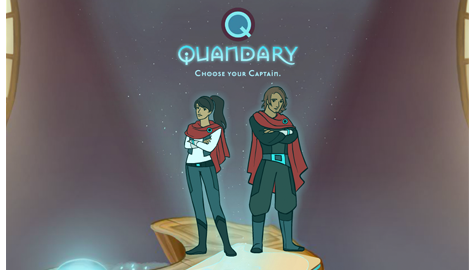Hello everyone! My name is Lisa Radden. I am excited to be joining the MomsRising community in an effort to help inform and support Moms around the world in the understanding of emerging technologies and their impact on child development and education.
I would like to kick off my first post about one of the hottest topics in technology in education: video games.
Your child loves them. Maybe you do, too! But aside from all those endless hours of fun, what value do video games have on your child's development? Can playing a video game help your child think ethically?
This month, the organization Games For Change announced their nominees for the 2013 Games For Change Awards. Games For Change is an organization that facilitates the creation and distribution of digital games not just for entertainment but for humanitarian and educational efforts.
One of the games recognized for Best Gameplay this year is Quandary, a free, online game for players aged 8-14 that engages kids in ethical decision-making and develops skills that will help them recognize ethical issues and deal with challenging situations in their own lives. Players learn such skills as perspective taking, empathy and critical thinking. Quandary lets players weigh arguments and make important decisions for Braxos, a fictional planet, by sorting fact from opinion and recommending a solution to a challenge faced by the colony.
Quandary was developed by a team of experts across the fields of child development, social and emotional learning, moral development and game design, and was launched in the fall of 2012 by the Learning Games Network, a non-profit spin-off of the MIT Education Arcade and the University of Wisconsin-Madison’s Games+Learning+Society Program. It has since received very positive feedback from both parents and educators in addition to its awards and nominations, and is continuing to develop as an at-home and in-school learning game that builds competency in ethical thinking.
Quandary is a great springboard for discussion at home, and the learning will be greatly enhanced if your child has a chance to further reflect on and discuss her or his game decisions after playing. You can use the Parent Guide to facilitate this discussion after playing Quandary.
What do YOU think?
Do you think video games like Quandary have a positive impact on your child’s moral development? Please try playing Quandary with your child and share your experience and feedback. Use the Parent Guide available here to help get you started.
Related Resources:



The views and opinions expressed in this post are those of the author(s) and do not necessarily reflect those of MomsRising.org.
MomsRising.org strongly encourages our readers to post comments in response to blog posts. We value diversity of opinions and perspectives. Our goals for this space are to be educational, thought-provoking, and respectful. So we actively moderate comments and we reserve the right to edit or remove comments that undermine these goals. Thanks!